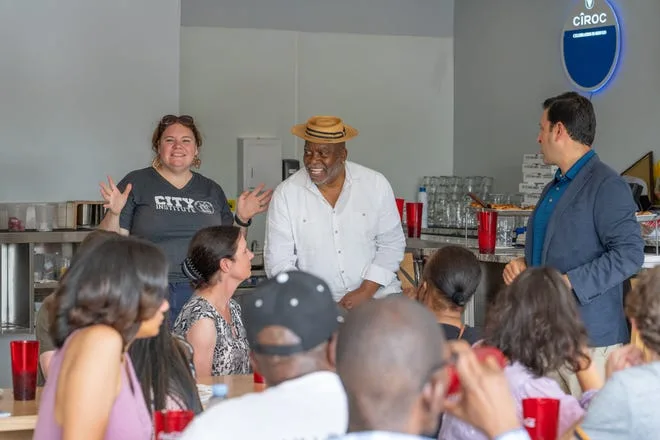
As a little boy, about 8 years old with his brown hair spiked in the late ‘90s style, Gabriel Gutierrez would take his brother’s hand and cross the street from his parents’ tortilla business, enter a heavenly smelling donut shop, pass the lively store patrons, and order a coffee for his mom or their employees.
For himself, he’d order a white cream Long John, somewhat like an éclair, just to eat the cream.
These days, Gutierrez owns that hand-cut donut shop, Donut Villa, in southwest Detroit, which has ties not only to his personal history but that of his family, whose first southwest Detroit business opened in the 1940s. It is part of the greater fabric of community histories that make up Detroit’s story, as told by the City Institute on one of their “Detroit in Context Learning Journey” tours.
The City Institute is one of a number of organizations to offer tours that go a bit deeper than sightseeing and basic headlines in Detroit. The groups seek to give context to where Detroit is now, where it is going, and often to correct the record on where it’s been.
Some tours explore the once prominent Black Bottom neighborhood, some explore Detroit’s history with the Underground Railroad, some explore Corktown, and ones like the City Institute’s “Learning Journey” also bring the city’s story forward to today and look to the future.
Though not a definitive list of all the tours in Detroit, here are some tour groups and guides to help deepen your knowledge:
City Institute
The “Learning Journey,” on which Gutierrez’s business was featured, is a yearly, all-day bus tour that goes neighborhood by neighborhood so that attendees can hear from business owners, investors, and nonprofit and city leaders on the history of the neighborhoods, what’s currently offered there, how it supports itself, and future projects. A shorter version of the tour is also offered, primarily for private tour groups.
The City Institute’s mission is to equip residents and stakeholders to build an inclusive, equitable and thriving future for Detroit. Southwest, with its shifting demographics over the last century, is just one neighborhood that can serve as a foundation for those seeking to understand the city a bit better, said Gutierrez.

“There’s a lot of history and a lot of stories,” Gutierrez said of the city. “Not always great, right? And for people to just understand that the communities that they are involved with, they have extensive roots and histories of their own that can provide context.”
Learning the city’s wins also encourages retention and keeps energy to fight for Detroit’s future, by the telling of Jeanette Pierce, founder and president of the City Institute.
“We believe it’s important for people to understand how we got to where we are … then come to today, where we actually meet and hear about and talk to people doing amazing work in the city,” said Pierce.
- Topics: Public tours include a virtual one on redlining, a form of housing discrimination, walking ones on architecture, specific neighborhoods including New Center and Black history, as told by those who lived it
- Cost: Public tours – free (with donations welcome) – $20, with “Learning Journey” tours $125 including meals; Private tours and private “Learning Journey” tours: $20 -$100 per person
- Length: 1.5 hours for virtual redlining history tours; generally 2 hours – all day for others
- Mode of transportation: Walking, bus or virtual
- Where to register: thecityinstitute.com/public-tours
(Note: Tour costs, lengths and topics vary for most organizations named in this story. Many are open to creating special programs upon request. Contact each tour guide and group for further details)
Black Scroll Network History & Tours
Jamon Jordan, Detroit’s first official historian, was appointed to his role in 2021 by Mayor Mike Duggan. Before that, however, he was already known as a prominent unofficial historian of the city, founding the Black Scroll Network History & Tours.
While Jordan said he encourages folks to do the tours that exist on restaurants, bars, the auto industry and the like, he said he realized they were leaving out a big part of the Detroit story – African American history.
On his various tours, Jordan may point out the neighborhood where three Detroit music legends grew up or talk about the presence of Black people in the region in 1700s. Some tours also explore the once thriving Black neighborhood and business district that were destroyed through racist officials, urban renewal and highway building, with Jordan pointing out the still present apartments, townhouses and school building that were given the space instead.
“A big portion of Detroit’s history is invisible, and you have to have someone help you see what is no longer present,” he said.
Wheelhouse Detroit
Another way to get a deeper knowledge of the city? By bike.
Wheelhouse Detroit is a bike shop along Detroit’s riverfront, but tours have been a part of its mission since its opening in 2008 thanks to owner Kelli Kavanaugh and her founding partner’s backgrounds in community development.
“It was important for us to tell a story of Detroit that isn’t necessarily the one that the masses hear or understand to be true,” she said, later adding: “We’re not cheerleaders, we’re trying to tell a real story of a very interesting and complicated city.”

This story includes discussion of history and current developments. On the Corktown tour she gives, Kavanaugh delves into how freeway development, urban renewal, and parking for Tiger Stadium shaped the neighborhood as it is now, along with gentrification there. She also uses history to counter any belief that it only got “cool” now.
- Topics: Poletown churches, Eastern Market, Hamtramck, the auto industry, techno and more.
- Cost: $30 for shorter, weekday tours ($40 including bike rental), $45 for 3-hour tours ($55 with rental) and private tours starting at $200-$250 for up to six people.
- Length: 2 hours for shorter, weekday tours, 3 hours for others
- Mode of transportation: “Pedal power,” using bikes or e-bikes, used manually. Attendees can bring bikes or rent from Wheelhouse Detroit
- Where to register:wheelhousedetroit.com
Ken Coleman
As a Detroit historian, journalist and communications professional, Ken Coleman likes to say he’s been dedicated to chronicling Black life in Detroit since 1991. should we note tht ken coleman works for xxxx?
His extensive historical knowledge goes back way further, of course, and it’s his passion to share Black history as an independent tour guide, covering whatever topics in that area a client may want.

Some favorite stops include the Gateway to Freedom International Memorial along the Detroit riverfront which pays homage to those who used and were involved in the Underground Railroad. There’s also the Second Baptist Church of Detroit, which lays claim to being the oldest religious institution owned by the Black community in the Midwest, a former station on the Underground Railroad and establishing the city’s first school for Black children.
- Topics: Motown, the Underground Railroad, Black Bottom and more
- Cost: Prices starting at about $50 per hour per small group, and generally $300-$500 for a 3-4 hour tour for a larger organization
- Length: 1-2 hours for walking tours, 3-4 for bus tours
- Mode of transportation: Walking or bus, if provided
- Where to register: Email Coleman at colemandetroit@gmail.com or call him at 313-551-1304
Preservation Detroit
Preservation Detroit was founded in 1975 as a student organization fighting the demolition of historic campus buildings at Wayne State University. These days the group works to preserve historic sites throughout Detroit, and it hosts tours on the history of architecture, sculptures and more to educate the masses.
A high point of downtown tour coordinator Davis Zaleski’s walking excursion is a visit to the Guardian Building, the 1920s, cathedral-like, Art Deco skyscraper. There’s also a quick stop by the recently reopened 38-story, Italian Renaissance-style Book Tower.

“During the early part of the 20th century, with the advent of the auto industry and all the other industries, they built like crazy and they built some of the most beautiful buildings in the country,” Zaleski said.
Some of that history has been torn down or poorly developed, but preservation has increased over the years, Zaleski said. Preservation Detroit likes to emphasize good development, and Zaleski said he hopes attendees walk away with an appreciation for what Detroit was and could be.
- Topics: Ferry Street, Midtown, Eastern Market, downtown, public art, cemeteries, churches and more
- Cost: $15 for members, students and seniors; $18 for all others on public tours; private tours, per the website, can be arranged for $100 for groups of five people or less and rates of $20 per person for larger groups
- Length: Between 2 and 2.5 hours
- Mode of transportation: Walking
- Where to register:preservationdetroit.org or through Eventbrite
Detroit History Tours
Detroit History Tours, along with the Detroit History Club, serves several purposes, said Bailey Sisoy-Moore, executive director of the two. Key among its motivations are the ideas that Detroit’s history should be written by Detroiters and that it’s hard to defund or vote to implode historic sites that are fully understood.
“History education helps make sure that the important parts of our history don’t disappear quietly,” Sisoy-Moore said.

The tour group tells the history of the city starting with the Native American tribes that were here first through to present day and even future development plans.
- Topics: Suffragettes, the Detroit People Mover transit system, cops and mobsters, LGBTQ history and more
- Cost: $27 for walking tours, $30-$65 for bus tours, $5 – $20 for self-guided mobile app tours with lifetime download; food tours are $80 – $120, including the meals and tips. Private tours start at $250 if transportation is provided, $450 for walking and $1,525 for tours with the van or bus provided by Detroit History Tours.
- Length: 2 hours for walking tours, 90 minutes to 3.5 hours for bus tours
- Where to register:detroithistorytours.com
Detroit Historical Society
Founded in 1921, the Detroit Historical Society now boasts tours at not only the Detroit Historical Museum and the Dossin Great Lakes Museum, but also at locations throughout metro Detroit.
Guided tours at the historical museum take groups of 15 or more people through the indigenous populations that were here, auto history, culture and more, said Kimmie Dobos, manager of education and public programs. There are also tailored museum tours that dive deeper into the African American experience and what led to the 1967 rebellion.
The Great Lakes museum, on Belle Isle, also features a maritime history tour exploring Detroit’s long history on the water from canoes to freighters and more.

For some off-site explorations, there are “Behind The Scenes” tours of historic locations including neighborhoods, a gallery, and a battlefield.
- Topics: The summer of 1967, Temple Beth El, Boston Edison, Eastern Market, tiny homes and more
- Cost: Guided tours at the museums are $11 for adults and $10 for seniors, the 1967 rebellion tour is $12 for adults and $11 for seniors, and the “Detroit’s African American Perspectives” tour with Jamon Jordan is $300 for up to 20 people.“Behind The Scenes” tours are $25 for members and $35 for nonmembers.
- Length: Generally 1- 1.5 hours
- Mode of transportation: Walking
- Where to register:detroithistorical.org
Of course, these are just some of the tour offerings in the city. You also can see the sights with a Segway tour, by boat and there’s even a tour to learn some Detroit history on a historic bar tour, among others.
Did we miss your favorite tour? Email dmoran@freepress.com and you might see it in a future story.


